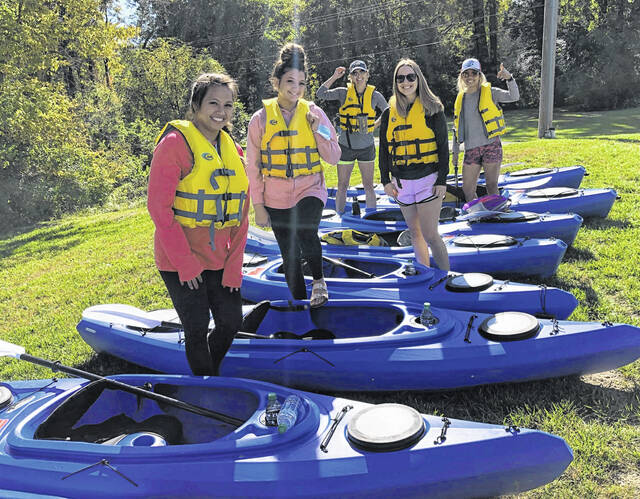
Edison State Community College students don their life vests and prepare for the voyage!
Dawn Hatfield | The Daily Advocate
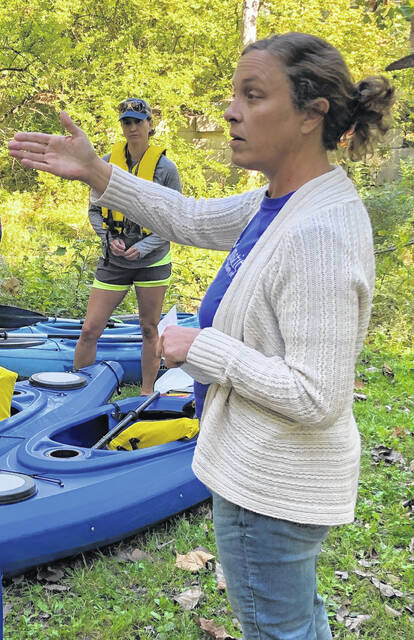
Leslie King, Director of the Rivers Institute at the University of Dayton, discusses the importance of waterways to the community and encourages students and staff to think about how we all contribute to the watershed.
Dawn Hatfield | The Daily Advocate
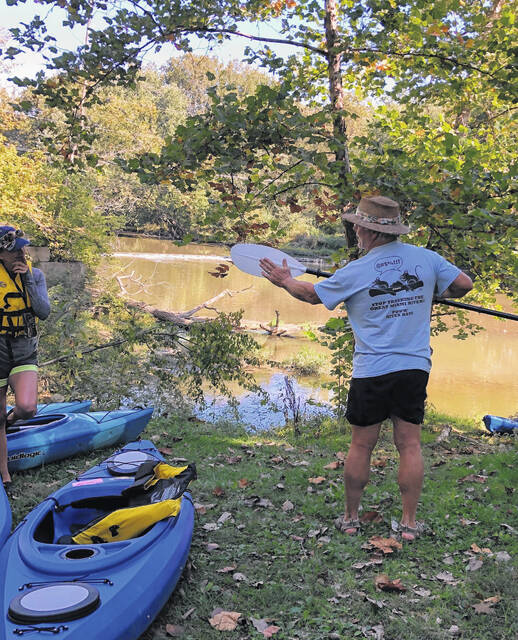
Founder of POWW (Protecting Our Water Ways), Jeff Lange, demonstrates how to properly hold and use oars before launching kayaks into the Great Miami River.
Dawn Hatfield | The Daily Advocate
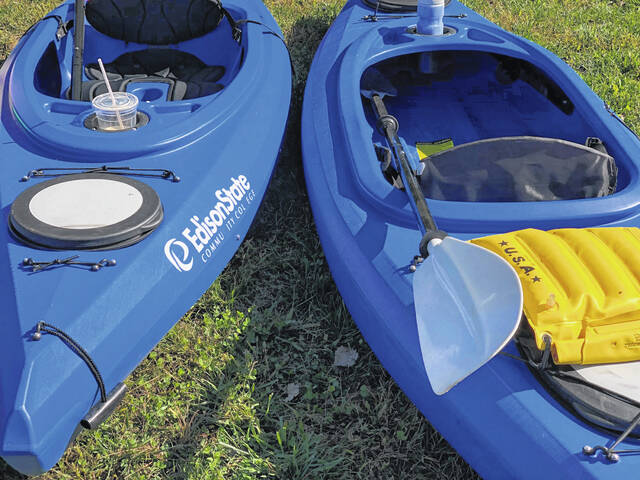
Edison’s Student Senate hosted the semi-annual Float, Learn, Feast event on Saturday, Oct. 2. Several students and staff participated in this free event beginning with a float down the Great Miami River in Piqua and ending with a free lunch. The floats take place twice each year, in both spring and fall terms.
Dawn Hatfield | The Daily Advocate
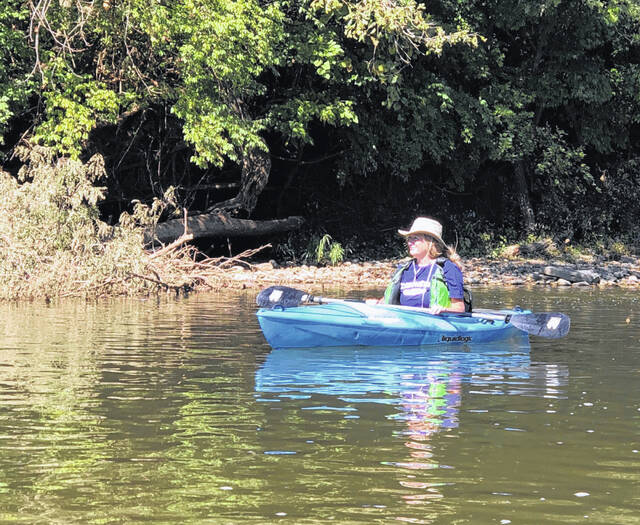
The day was picturesque and perfect for a jaunt down the river.
Dawn Hatfield | The Daily Advocate
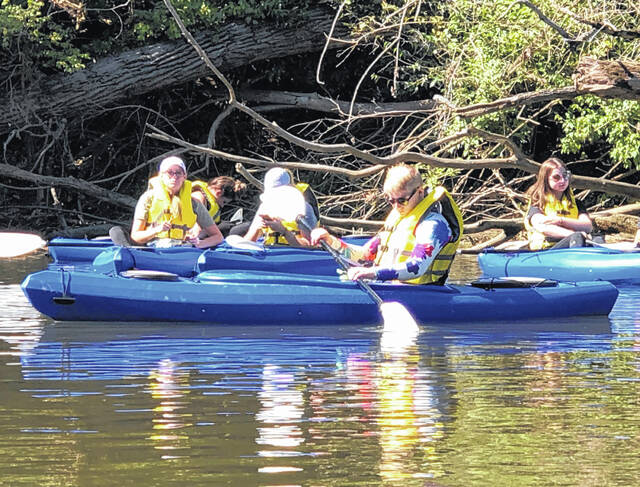
Students learn to navigate their kayaks in the beautiful Miami River.
Dawn Hatfield | The Daily Advocate
By Dawn Hatfield
DailyAdvocate.com
PIQUA — What kind of class can rouse college students from bed on a free Friday morning? One that doesn’t feel like a class at all, of course! Students, staff, faculty, and friends of Edison State Community College gathered to participate in year five of the semi-annual “Float, Learn, Feast” adventure on Friday, Oct. 1.
Set in Piqua on the Great Miami River, participants embarked on a two-hour kayak trip, beginning at Roadside Park. Edison State Community College and the Student Senate offered this free excursion and free lunch to all students, staff, and faculty of the college. Before launching, Chris Spradlin, Edison State Provost, welcomed the participants and shared the history of the event, which began when Mainstreet Piqua’s Down a River — Down a Beer (DARDAB) offered to buy kayaks for the college to help initiate a program focusing on the importance of waterways in the area. Edison’s program is named “River Stewards” as an homage to the similarly-named program at the University of Dayton.
Spradlin then introduced guest speaker, Leslie King, Director of the Rivers Institute at the University of Dayton, who impressed upon participants just how special a resource the Great Miami River is to the communities of the Miami Valley. King began, “I’m really glad you signed up to be here today. Hopefully you signed up because it looked like a good way to spend the day, and hopefully it continues to become even more rewarding and more impactful than you really ever could have imagined, and potentially transformative, right? That’s really what experiential learning does; it puts you in situations that you’re not used to being in, to learn, challenge yourselves, think about different ways to see the world, different ways to see the subjects you’re learning in classes, and maybe different ways to see your own community.”
King set the tone for the day and led participants in a land acknowledgement exercise, by closing their eyes and focusing on the sounds and sensations along the riverside. She challenged the group to “be present” with the river and to realize that it is “ever-changing.” She continued, “Someone once told me, ‘If you want to know the river, learn the valley.’” In exploring the valley-river connection, one student remarked, “When I’m out in nature, I feel tranquil, like I get my sanity back — that’s how I kind of reconnect myself.”
King continued, “What’s happening on that land is gonna show up in that river… not just here, but upstream, downstream, all the communities that you’re connected with by that river. And then you start to think about our community as a watershed, because that’s a valley — we live in the Miami Valley, the Great Miami Valley watershed… A watershed, simply, is like a basin, an area of land where all the water that hits it drains to the same place. According to [19th C. American geologist] John Wesley Powell, a watershed is an area of land, a geographic boundary, where all living beings within it are inextricably linked by its hydrological [water] system, and that in itself makes us a community… Had our states been broken up how John Wesley Powell thought, we’d be divided by watersheds, and the Ohio River would all of a sudden become the center of the state. So think about how that would start to shift the way communities think about rivers.” King ended, “The river is actually the most important resource in the community, the most strategic asset through economic, ecological, aesthetic, social well-being.”
King then passed to torch to Jeff Lange, Founder of POWW, whom she described as “one of [her] great teachers.” Lange demonstrated proper rowing technique and safety measures to the group. In addition to ensuring Edison students and staff would have a safe float down the river, Lange shared information about his foundation, “I have a non-profit called POWW, Protecting Our Water-Ways, and we’ve been in existence since 2004. We put volunteers out on the Great Miami River, from south Sidney to south Piqua, our 16 miles of adopted river-way. We clean the trash out of it as one section of 18 sections that clean trash out of the whole Great Miami River, from Indian Lake all the way down to the Ohio River… We have gotten, hold your hats on here, 198,250 pounds of trash out of this river in 18 years on just this 16 miles. That includes 1,785 tires. We do it, not with kayaks, but with canoes, and we use the canoes as floating dump trucks. We do all this from tremendous community support, local foundations, local businesses to buy our equipment with.”
POWW volunteers join in the Clean Sweep of The Great Miami River on the third Saturday of each July. The team has logged more than 10,600 community man hours. An average of 100 volunteers canoe or walk down the river to pick up trash as they travel. The sweep culminates in a free lunch, cold drinks, and even a t-shirt. Jeff who has always loved paddling down the Great Miami River said, “I love this river a lot. You’d be hard-pressed to find somebody that loves it more than I do!”
Jennifer, a part-time Edison student in the Microsoft class, was quick to express her appreciation to the river stewards, King and Lange, saying, “Thank you for all of your work because I grew up around here, hadn’t lived here for over 20 years, but coming back, it’s totally different from when I was a kid. It’s so attractive, so beautiful, and it was not that way when I was little.”
The next two hours offered a wonderful opportunity to soak up the sun and the natural beauty of the river. Many students and staff were kayaking for the first time, and the Great Miami River was a wonderful place for their maiden voyage being only a couple feet deep throughout most of the trip. A few snags in low waters and an accidental tipping provided laughter and learning experiences for the newest kayakers.
Upon landing at the Great Miami River Trail just north of the Garnsey Street bridge, participants received goodie bags with river maps, t-shirts, stickers, and more. A delicious lunch was included, and everyone was happy to fill their stomachs after the lovely afternoon workout on the water.
For information on upcoming “Float, Learn, Feast” events, email [email protected].
For additional information on the Rivers Institute, visit udayton.edu/artssciences/ctr/fitz/rivers_inst/index.php.
For more information on POWW or to learn how to volunteer, visit www.protectingourwaterways.org/volunteer.html.
Dawn Hatfield covers education stories for The Daily Advocate. Have a school-related event to share? Reach out by email at [email protected] or by phone at 937-569-0066.




